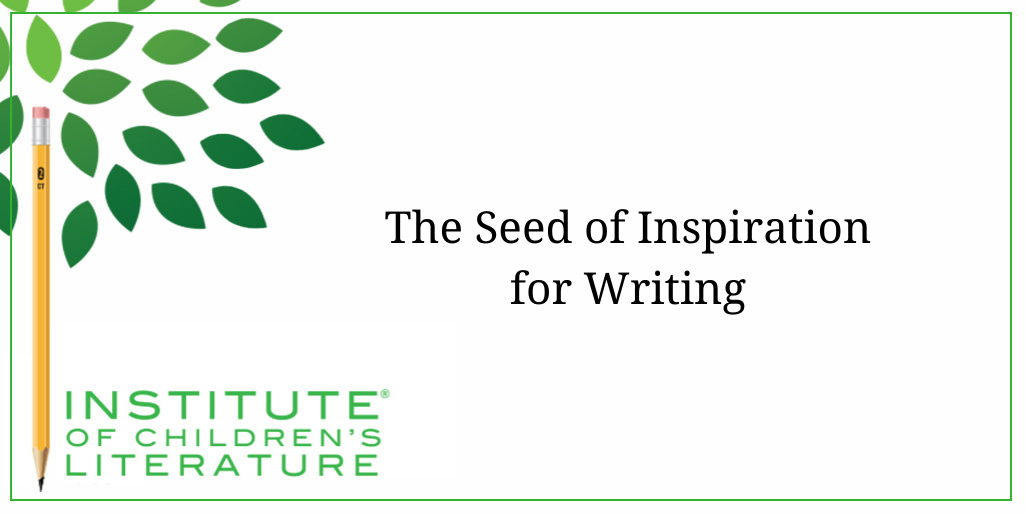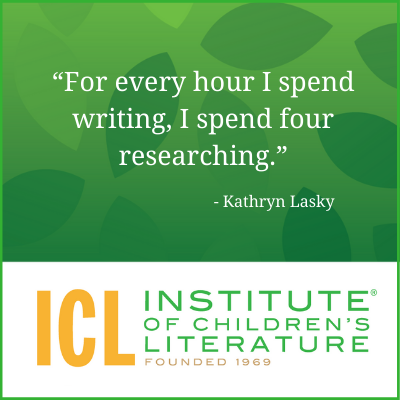
Riveting Resolutions: 10 Effective Article Endings
Writing an effective nonfiction article ending is one of the most overlooked aspects of writing. Leave your reader satisfied with these riveting resolutions!

Inspiration is the seed from which a story grows. Inspiration for writing increases energy, morale, and writing flow. Without inspiration, writing can seem like a slow, burdensome process. Inspiration seems to light a fire under writers and that makes everything about the process easier and smoother. Often the premise you will pursue in your story is born from inspiration. That initial inspiration can come from nearly anywhere including mining family stories, being alert to story potential in everything around us, or even through mining ideas from dreams.
Take a moment to research writers you admire and discover where the inspiration for their books originated. Kathryn Lasky’s first book, The Night Journey, was inspired by and based on a true story from her own family. The plot of E.B. White’s classic, Stuart Little, was inspired by a dream the author had, though it took two decades to go from inspiration to a completed novel. Kathleen Duey’s series, The Unicorn’s Secret, was inspired by recurring dreams she has in third and fourth grade. In each of these cases, the seed of inspiration was planted long before the final work grew. Inspiration is only step one. Time and work come next, and most books require quite a bit of both.
Since the inspiration for writing doesn’t instantly result in a finished story or book (most of the time), capturing inspiration for use later is an essential part of the process. I have a file on my computer where I drop all the bits and bobs of inspiration that pop up when I’m working on an unrelated project or taking a shower or reading a book. Some writers carry a notebook everywhere for the same purpose of capturing inspiration when it flits through their heads.

I have a great writing friend who woke in the night with what she was certain was the perfect inspiration for her next book. She grabbed her notebook and scribbled a note that she felt certain would trigger the inspired idea in the morning. Then the next morning, she eagerly turned to the notebook where she found she had simply scrawled the word: “light.” She remembered nothing about her dream and nothing about the inspired idea she’d had. The word “light” didn’t help retrieve it. To this day, she has no idea how “light” was supposed to help her create her masterwork, but she’s always open to the possibility of remembering eventually. Clearly, writing notes about dream inspiration can be challenging, but when it works, the results are spectacular.
I’ve met other writers who prefer to make their inspiration notes by speaking them aloud. These writers may use their phones to take notes, or (those of us digital dinosaurs) even a digital recorder. The benefit of a verbal note is that it can be made in the dark. It’s likely to be longer and clearer than a freshly wakened scrawl. And if your digital recorder has a voice-activated function (or your phone does) you can make notes even from the shower without risking wet notebooks. Plus, many of us carry our phones everywhere, so it’s always available for note-taking. Whatever note-taking device you use, it’s good practice to transfer your quickly created note to a more permanent form as soon as possible.
I tend to carry sketchbooks around with me, so I’ll make inspiration notes in that, but I always transfer them to my inspiration file as quickly as possible while the idea is still fresh. The more time that passes, the more insubstantial the inspired idea can feel, so I always try to write as full a description of the idea as I can, including bits of dialogue that come to me, scene descriptions, plot details, and other things that I brainstorm while the inspiration is still fresh and exciting. The more I note, the more likely I’ll actually turn the inspired idea into finished form someday.
For me, inspiration is always an excellent fuel to overcome procrastination, an ailment I’ve had all my life. I tend to shy away from hard work unless I’m caught up in an exciting idea. So the inspiration for writing is hugely valuable to me for that reason. It’s why I always write so much right after a writing conference, a workshop, a writing course, or reading writing books. I tend to be pumped up with the energy of inspiration and ready to let it drive me into the work. Because writing is work. Research is work. It can be incredibly enjoyable work, or it can be a tough slog, but it’s never a holiday. I will need to accept that work if I’m to grow my inspired idea into a publishable finished product. And for me, publication is always the goal, so I accept work as the cost of that. For me, inspiration is the spoonful of sugar that helps that go down.

Luckily, skill-building is inspiring also. That’s why I am always so eager to write after a workshop or conference or writing class. By putting myself into these skill-building situations, I find that I’m giving myself permission to write without publication as the goal. And that always unleashes new inspiration. It’s one reason why I tend to recommend such things to other writers, especially anyone who has been struggling to find new inspiration and new energy for their work.
I often can’t wait for inspiration for writing. Sometimes I simply have to jump in and write. Still, I have to admit, if I do that too often, I begin to bog down and the work becomes rough. So I have a few tried and true places to go to refuel, reinvigorate, and get inspired. Sometimes it’s taking a break and spending the whole day doing something fun and non-writing-related. Inspiration can be about living as much as it’s about writing. Sometimes I go in search of new ideas or new skill-building through reading or workshops. And sometimes I go for the quick inspiration boost through a walk or a shower. By knowing what sorts of things work to inspire, I have an inspiration plan ready for when I need a small boost or a real break-and-refuel period.
So think about what sorts of things fill your inspiration well. Make lists if that will help you remember all the times you’ve been overflowing with inspiration. Then be sure to take time for regular refueling. The writing you inspire will be your own.
With over 100 books in publication, Jan Fields writes both chapter books for children and mystery novels for adults. She’s also known for a variety of experiences teaching writing, from one session SCBWI events to lengthier Highlights Foundation workshops to these blog posts for the Institute of Children’s Literature. As a former ICL instructor, Jan enjoys equipping writers for success in whatever way she can.

Writing an effective nonfiction article ending is one of the most overlooked aspects of writing. Leave your reader satisfied with these riveting resolutions!

One of the best ways to learn what makes an engaging article opening is to study published nonfiction pieces and to see what made them successful. Let’s do it!

Writing a nonfiction article isn’t easy. However, it may be easier and quicker than writing and selling a picture book and the benefits may surprise you!
1000 N. West Street #1200, Wilmington, DE 19801
© 2024 Direct Learning Systems, Inc. All rights reserved.
1000 N. West Street #1200, Wilmington, DE 19801
© 2024 Direct Learning Systems, Inc. All rights reserved.
1000 N. West Street #1200, Wilmington, DE 19801
© 2024 Direct Learning Systems, Inc. All rights reserved.
1000 N. West Street #1200, Wilmington, DE 19801
© 2024 Direct Learning Systems, Inc. All rights reserved.

1000 N. West Street #1200, Wilmington, DE 19801
© 2024 Direct Learning Systems, Inc. All rights reserved.

1000 N. West Street #1200, Wilmington, DE 19801
©2024 Direct Learning Systems, Inc. All rights reserved. Privacy Policy.
1 Comment